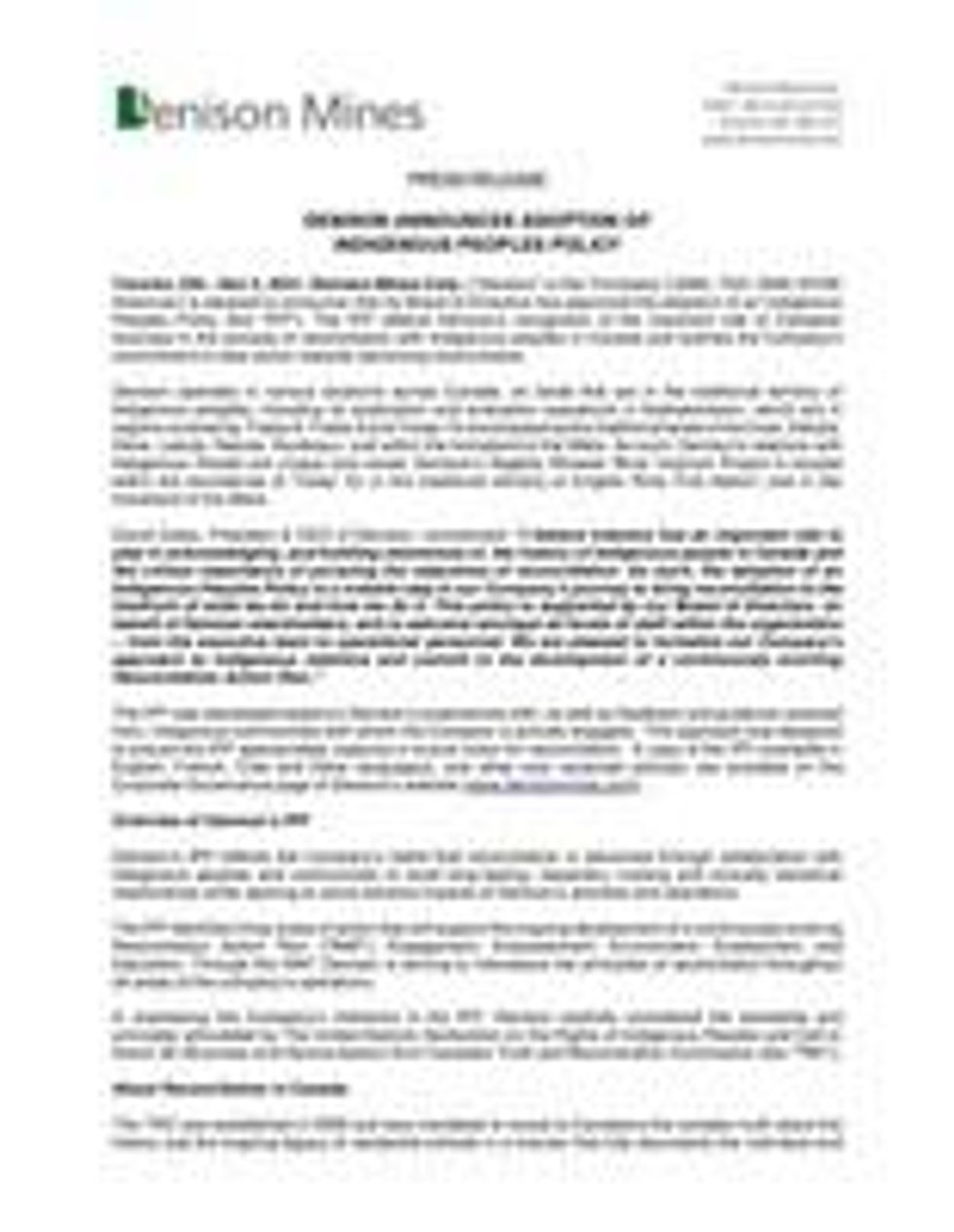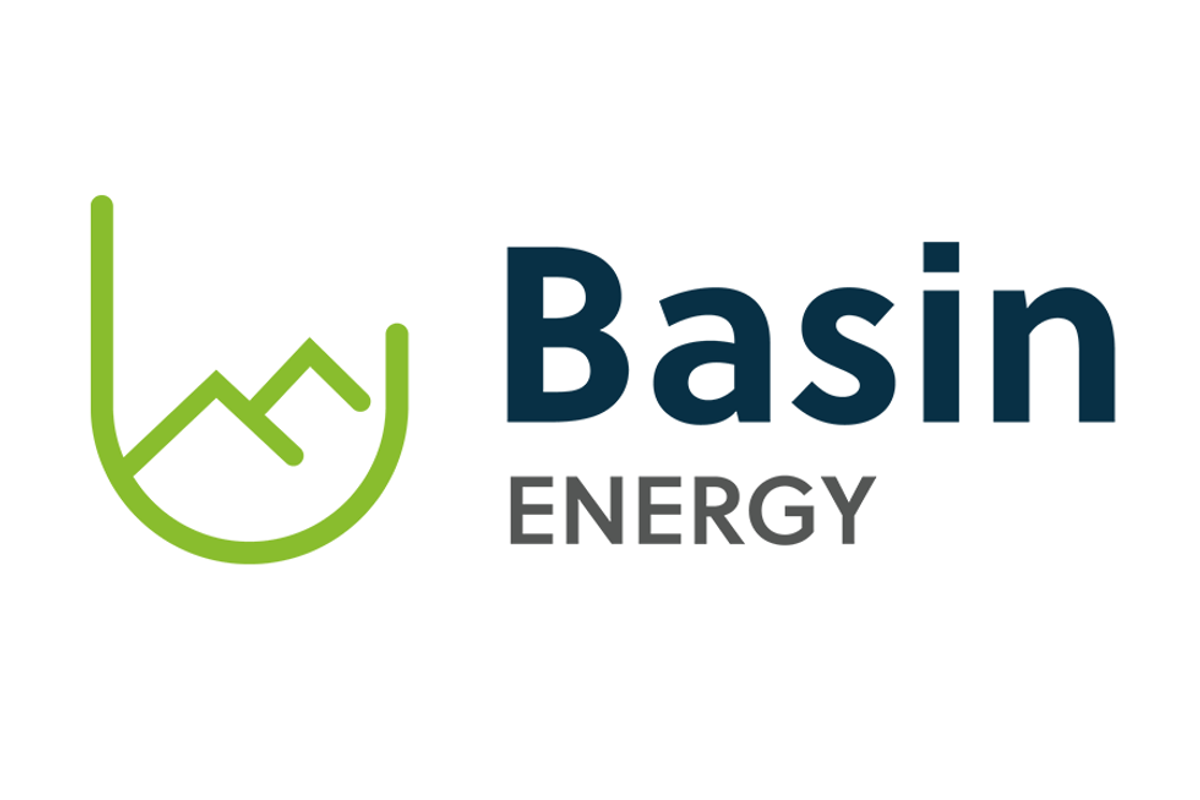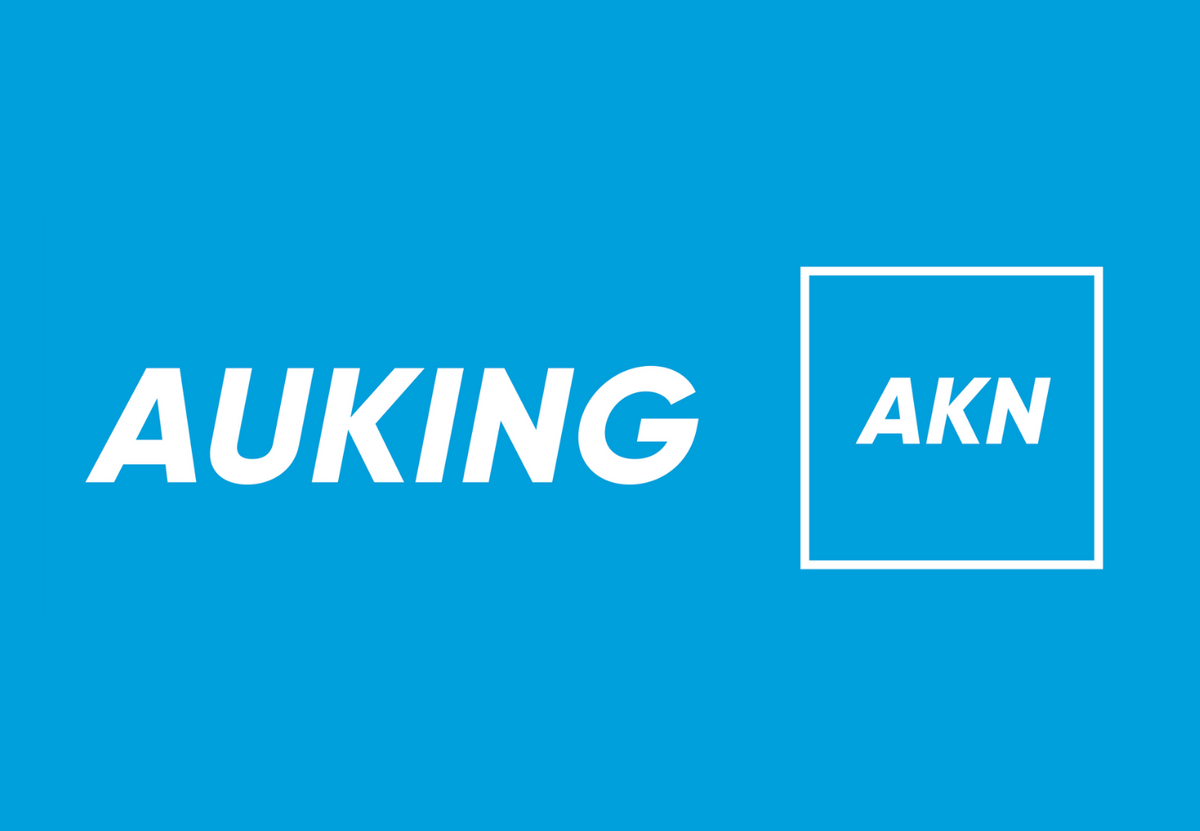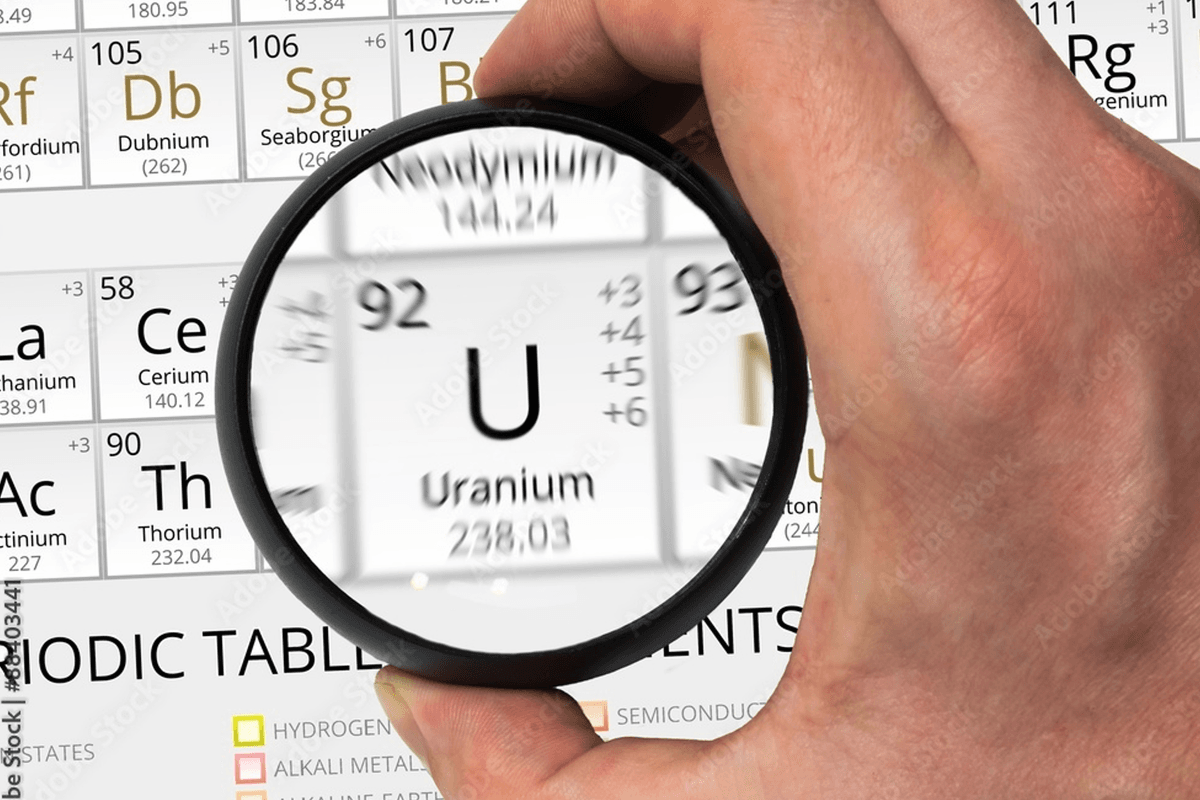Denison Mines Corp. ("Denison" or the "Company") (TSX: DML) (NYSE American: DNN) is pleased to announce that its Board of Directors has approved the adoption of an Indigenous Peoples Policy (the "IPP"). The IPP reflects Denison's recognition of the important role of Canadian business in the process of reconciliation with Indigenous peoples in Canada and outlines the Company's commitment to take action towards advancing reconciliation. View PDF version .
Denison operates in various locations across Canada , on lands that are in the traditional territory of Indigenous peoples, including its exploration and evaluation operations in Saskatchewan , which are in regions covered by Treaty 6, Treaty 8 and Treaty 10 encompassing the traditional lands of the Cree, Dakota, Déne, Lakota, Nakota, Saulteaux, and within the homeland of the Métis. As such, Denison's relations with Indigenous People are unique and varied. Denison's flagship Wheeler River Uranium Project is located within the boundaries of Treaty 10, in the traditional territory of English River First Nation, and in the homeland of the Métis.
David Cates , President & CEO of Denison, commented: " I believe Industry has an important role to play in acknowledging, and building awareness of, the history of Indigenous people in Canada and the critical importance of pursuing the objectives of reconciliation. As such, the adoption of an Indigenous Peoples Policy is a notable step in our Company's journey to bring reconciliation to the forefront of what we do and how we do it. This policy is supported by our Board of Directors, on behalf of Denison shareholders, and is welcome amongst all levels of staff within the organization – from the executive team to operational personnel. We are pleased to formalize our Company's approach to Indigenous relations and commit to the development of a continuously evolving Reconciliation Action Plan."
The IPP was developed based on Denison's experiences with, as well as feedback and guidance received from, Indigenous communities with whom the Company is actively engaged. This approach was designed to ensure the IPP appropriately captures a mutual vision for reconciliation. A copy of the IPP (available in English, French, Cree and Déne languages), and other core corporate policies, are available on the Corporate Governance page of Denison's website ( www.denisonmines.com ).
Overview of Denison's IPP
Denison's IPP reflects the Company's belief that reconciliation is advanced through collaboration with Indigenous peoples and communities to build long-lasting, respectful, trusting and mutually beneficial relationships while aspiring to avoid adverse impacts of Denison's activities and operations.
The IPP identifies 5 key areas of action that will support the ongoing development of a continuously evolving Reconciliation Action Plan ("RAP"): Engagement; Empowerment; Environment; Employment; and Education. Through the RAP, Denison is striving to interweave the principles of reconciliation throughout all areas of the company's operations.
In expressing the Company's intentions in the IPP, Denison carefully considered the standards and principles articulated by The United Nations Declaration on the Rights of Indigenous Peoples and Call to Action 92 (Business and Reconciliation) from Canada's Truth and Reconciliation Commission (the "TRC").
About Reconciliation in Canada
The TRC was established in 2008 and was mandated to reveal to Canadians the complex truth about the history and the ongoing legacy of residential schools in a manner that fully documents the individual and collective harms against Indigenous peoples, and to guide and inspire a process of truth and healing, leading toward reconciliation within Indigenous families, and between Indigenous peoples and non-Indigenous communities, churches, governments, and Canadians generally.
As the TRC summarizes in its reports from 2015, the residential school system was "part of a coherent policy to eliminate Aboriginal people as distinct peoples and to assimilate them into the Canadian mainstream against their will." Operating over a period of almost 130 years, from 1870 to 1997, the Government of Canada estimates that over 150,000 First Nation, Métis, and Inuit students passed through the system.
Reconciliation is described by the TRC as "an ongoing individual and collective process of establishing and maintaining respectful relationships… amongst First Nations, Inuit and Métis former Indian Residential School students, their families, communities, religious entities, former school employees, government and the people of Canada ." Amongst many other things, the TRC notes that "a critical part of this process involves repairing damaged trust by making apologies, providing individual and collective reparations, and following through with concrete actions that demonstrate real societal change".
In support of the reconciliation process, the TRC issued 94 Calls to Action – including, but not limited to, those related to child welfare, education, language and culture, health, justice, the rights of Indigenous peoples, missing children and burial information, commemoration, media, sport, and business.
More information about Canada's Truth and Reconciliation Commission can be obtained from the Government of Canada's website ( https://www.rcaanc-cirnac.gc.ca/eng/1450124405592/1529106060525 ) and the website for the National Centre for Truth and Reconciliation ( https://nctr.ca/ ).
About Denison
Denison is a uranium exploration and development company with interests focused in the Athabasca Basin region of northern Saskatchewan, Canada . The Company has an effective 95% interest in its flagship Wheeler River Uranium Project, which is the largest undeveloped uranium project in the infrastructure rich eastern portion of the Athabasca Basin region of northern Saskatchewan . Denison's interests in Saskatchewan also include a 22.5% ownership interest in the McClean Lake joint venture, which includes several uranium deposits and the McClean Lake uranium mill that is contracted to process the ore from the Cigar Lake mine under a toll milling agreement, plus a 25.17% interest in the Midwest Main and Midwest A deposits, and a 66.90% interest in the Tthe Heldeth Túé ("THT," formerly J Zone) and Huskie deposits on the Waterbury Lake property. Each of Midwest Main, Midwest A, THT and Huskie are located within 20 kilometres of the McClean Lake mill.
Through its 50% ownership of JCU, Denison holds additional interests in various uranium project joint ventures in Canada , including the Millennium project (JCU 30.099%), the Kiggavik project (JCU 33.8123%) and Christie Lake (JCU 34.4508%).
Denison is also engaged in mine decommissioning and environmental services through its Closed Mines group, which manages Denison's Elliot Lake reclamation projects and provides post-closure mine care and maintenance services to a variety of industry and government clients.
Follow Denison on Twitter @DenisonMinesCo
Cautionary Statement Regarding Forward-Looking Statements
Certain information contained in this news release constitutes 'forward-looking information', within the meaning of the applicable United States and Canadian legislation concerning the business, operations and financial performance and condition of Denison.
Generally, these forward-looking statements can be identified by the use of forward-looking terminology such as 'plans', 'expects', 'budget', 'scheduled', 'estimates', 'forecasts', 'intends', 'anticipates', or 'believes', or the negatives and/or variations of such words and phrases, or state that certain actions, events or results 'may', 'could', 'would', 'might' or 'will be taken', 'occur', 'be achieved' or 'has the potential to'. In particular, this news release contains forward-looking information pertaining to the IPP and Denison's intentions and expectations with respect thereto; and expectations regarding its joint venture ownership interests and the continuity of its agreements with its partners.
Forward looking statements are based on the opinions and estimates of management as of the date such statements are made, and they are subject to known and unknown risks, uncertainties and other factors that may cause the actual results, level of activity, performance or achievements of Denison to be materially different from those expressed or implied by such forward-looking statements. Denison believes that the expectations reflected in this forward-looking information are reasonable but no assurance can be given that these expectations will prove to be accurate and results may differ materially from those anticipated in this forward-looking information. For a discussion in respect of risks and other factors that could influence forward-looking events, please refer to the factors discussed in Denison's Annual Information Form dated March 26, 2021 under the heading 'Risk Factors'. These factors are not, and should not be construed as being exhaustive.
Accordingly, readers should not place undue reliance on forward-looking statements. The forward-looking information contained in this news release is expressly qualified by this cautionary statement. Any forward-looking information and the assumptions made with respect thereto speaks only as of the date of this news release. Denison does not undertake any obligation to publicly update or revise any forward-looking information after the date of this news release to conform such information to actual results or to changes in Denison's expectations except as otherwise required by applicable legislation.
SOURCE Denison Mines Corp.









